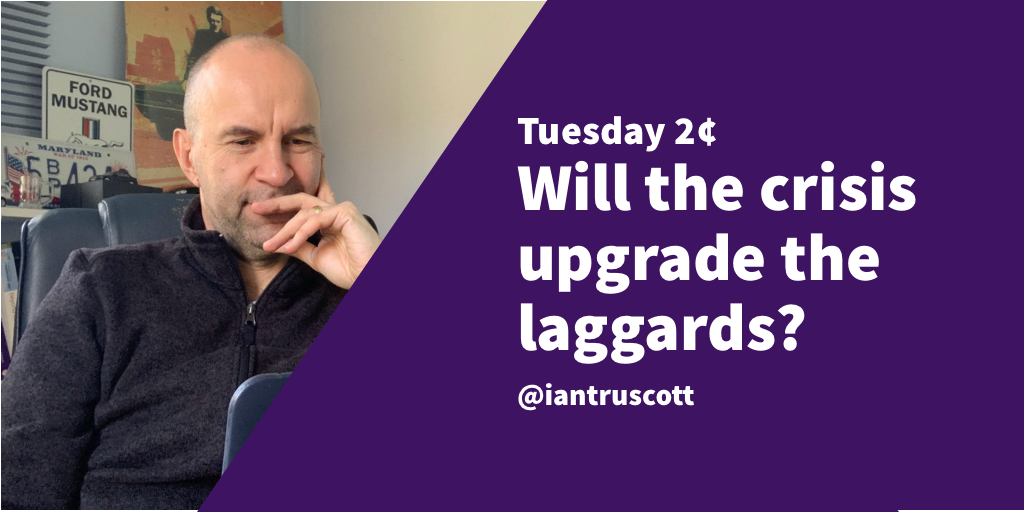For sure, this virus is devastating people and will hurt our economy. But, I’m continuing on my theme of the last couple of posts, pondering what changes the current crisis will bring the world of work and marketing, where there are some positives, as it sure beats the news right now.
You are probably very familiar with the technology adoption curve (below), a model first conceived in the late fifties and debated in the works of contemporary business and marketing writers like Geoffrey Moore and Clayton M. Christensen and has been applied to everything from IT in education, mobile phone adoption to social media.

The idea is that whenever something new comes along, we are all on a spectrum of innovators, early adopters, early or late majority to laggards stubbornly refusing to change.
Right now, in so many aspects of lives, the corona crisis is scooping up the laggards and bringing them firmly up to date.
Businesses that failed to grasp flexible working now have to trust their employees to work around their families. Every business, whether a laggard on this policy or not, has had to get with the early adopters, accelerating themselves into the late majority.
Remote working has been the way of working for a relatively small number of people (although the most vocal on social media). We are barely at the “early majority” part of the graph here. In 2019, there were 4.3 million remote workers in the USA, which makes up a mere 3.2% of the entire workforce and 44% of companies didn’t allow remote work at all (according to this article). Sure, there are lots and lots of people employed in jobs that can’t be done from home, but it’s not the entire 96.8% of the remaining workforce. A swathe of companies moved from the edges of this graph to the majority almost overnight.
(Added 8th April: There is research from Gartner to support this)
Consumers are being upgraded; I was chatting to an executive at a bank the other day, older banking consumers that have clung on to their passbooks, the laggards of credit cards and online banking, have had to move with the majority.
Independent shops and pubs are banding together to provide community-driven online shopping and deliver services. In a crisis, they’ve discovered that they can offer something different to Amazon and join the majority online.
Corporate digital transformation, a practice that seemed to have been kicked into the weeds, is now back at the top of the corporate agenda. Employees realize that they need more than a laptop, Zoom, and Slack to get the job done; they need digital processes and tools while consumers start to discover what organizations are offering as a digital experience.
The “wet signature” (as I heard it described today), a crucial part of buying a house, is in for an upgrade. Industry events, the reason to fly to a meeting, the need to own a car, the train season ticket, the supply chain, education, the equality of labor in childcare, and domestic chores. There are so many big and small parts of our lives that could be potentially upgraded.
Maybe finally shaking the industrial age thinking that has kept us living and working like our grandparents, moving us closer to what today’s technology can offer our lives, to no longer be laggards.
Maybe.
Fancy more of this?
Subscribe to my Rockstar CMO Newsletter

I’m a 3xCMO, now a marketing strategy advisor and podcast host at Rockstar CMO. Although, I’m not a rock star, but a marketing leader, strategist, content marketer, columnist, speaker, industry watcher, and creator of ART (Awareness, Revenue, and Trust) for the companies I work with. But most of all, I am an enthusiastic tea drinker.
You can find me on LinkedIn, Twitter, or now Threads! – or listen to my weekly podcast at Rockstarcmo.com
The half-baked thoughts shared on this blog may not reflect those of my employer or clients, and if the topic of this article is interesting or you just want to say hello please get in touch.
